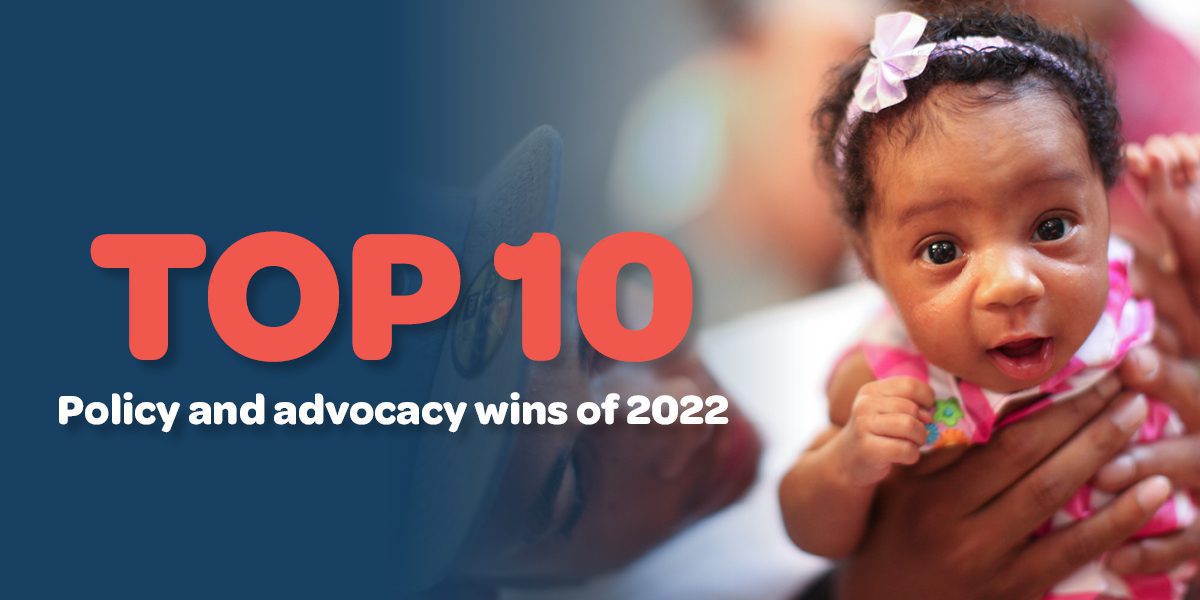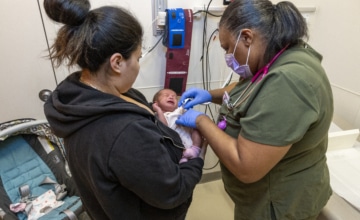We asked you to Be a Big Voice for Little KidsTM in 2022, and you delivered. Thank you! As we look back on an eventful year, these are just some of the ways baby champions like you stood strong and moved policy change for babies and families.
1. States used funds from the American Rescue Plan Act (ARPA) to set the stage for better policies for babies. For example, in Michigan, communities were recently invited to apply for Child Care Innovation Fund grants, made possible by ARPA, to support regional systems planning, apprenticeship opportunities, or the development of family child care networks. In Kentucky, ARPA funds enabled the state to make child care employees a protected population in the child care subsidy program, giving providers easier access to subsidies for their own children. Wisconsin applied the funds to expand infant and early childhood mental health (IECMH) consultation in child care. Connecticut used ARPA money to establish a regional pilot for universal nurse home visiting for families with newborns, integrating it with state community health worker initiatives. Maine used ARPA funds to provide a monthly $200 stipend to early childhood educators in the state and allocated general funds in the most recent state budget to continue them. Next year, the stipend model will transition to a tiered system based on provider experience and education.
2. Appropriations for little kids moved up the growth chart. In March, President Biden signed the spending bill for Fiscal Year 2022 into law, approved through Congress’s annual appropriations process. While funding increases across the board were modest, the final bill included increases for key programs for babies and toddlers, including the Child Care and Development Block Grant, Head Start and Early Head Start, Preschool Development Grants, Part C of the Individuals with Disabilities Education Act, the Infant-Toddler Court Program, Infant and Early Childhood Mental Health Grants, funding for early child development specialists in pediatric settings, and supports for basic needs programs like nutrition and housing.
3. Communities took young children into their own arms. Absent sufficient federal or statewide funding and attention, communities across the nation are looking for their own solutions to longstanding early care and learning challenges. For example, Mayor Michelle Wu established an early childhood office for the city of Boston, MA. Communities also dedicated focused funding. For example, this spring, New Orleans, LA passed the city’s Early Childhood Education Proposition, a new property tax providing access to high-quality early care and education for at least 1,000 children under the age of 4 per year. In Harris County, Texas, county commissioners approved a new $50 million dollar investment to create 1000 high-quality infant and toddler child care slots.
4. Congress invested in the future of our planet – and the future of our babies – by addressing climate change. In August, President Biden signed the Inflation Reduction Act into law. Early childhood advocates applauded the investment of nearly $370 billion in clean energy and greenhouse gas reduction over the next ten years – the largest investment ever to combat the climate crisis that threatens the well-being of infants and toddlers. Research links the climate crisis to worsened pregnancy outcomes, food insecurity, increased physical and mental health problems, and developmental delays in young children. This bold action taken by Congress and the Administration will help secure a healthier, safer future for babies and toddlers whose future on the planet will be shaped by decisions adults make right now.
5. States invested their own dollars to better serve babies. In addition to the Maine example described above, several states took steps to build stronger child care systems. For example, in the District of Columbia, child care workers received supplemental checks from $10,000 – $14,000, the first stage of implementation of a new bill offering child care providers increased wages and health insurance. In New Mexico, voters overwhelmingly passed a constitutional amendment to create a significant, dedicated funding stream for early childhood education in the state. This historic amendment will raise around $150 million a year for child care and early learning, a sustained investment in affordable, high-quality child care and worthier wages for early childhood educators, as well as increased access to home visiting. And in California, the state Medicaid program will cover dyadic therapy for the first time ever, allowing babies and families to receive those services together.
6. Maternal, Infant and Early Childhood Home Visiting (MIECHV) was in (and passed!) the House. The House of Representatives gave resounding bipartisan approval to a 5-year extension of home visiting through the Jackie Walorski Maternal and Child Home Visiting Reauthorization Act of 2022. Hopes are high for completing the reauthorization by the end of the year. If passed, the bill will double the level of investment to $800 million over 5 years, while increasing funds for tribal programs.
7. Think Babies state partners continued to make big strides for little kids. Colorado passed a refundable income tax credit for early childhood educators, expanded access to Medicaid and CHIP for those who would otherwise be eligible if not for immigration status, and established a new department of early childhood. Georgia extended postpartum Medicaid coverage from six to 12 months, and improved infant and early childhood mental health (IECMH) policies. New Jersey passed Thriving by Three, a $28 million legislative initiative to develop more quality child care for infants and toddlers, targeted to low-income communities and/or child care deserts. The state also made significant investments in home visiting and raised rates for maternity care providers. North Carolina saw increased investments in child care. In Rhode Island, advocates achieved a Medicaid reimbursement rate increase for Part C early intervention services and expanded eligibility for child care studies. Finally, Michigan doubled their state investment for IECMH consultation in child care to $3 million, including an additional state-funded coordinator position, solidifying infrastructure for those services in the state.
8. Congress helped babies eat their fruits and veggies with funding for the Special Supplemental Nutrition Program for Women, Infants and Children (WIC). First enacted through COVID relief as a short-term benefit, the boost, in accordance with the Dietary Guidelines for Americans, offered WIC recipients enhanced benefits for the purchase of fruits and vegetables. Without a doubt, the benefit bump resulted in increased fruit and vegetable consumption for families enrolled in WIC. Recognizing its impact, Congress continued the bump through 2022. Now, children receive $24/month, pregnant and postpartum participants receive $43/month, and breastfeeding participants receive $47/month for fruits and vegetables compared to benefits of only $9/month for children and $11/month for produce before the bump. We hope to see this benefit boost enacted on a permanent basis.
9. Advocates showed up big for infants and toddlers, keeping pressure on policymakers to prioritize young children and families and the issues that matter to them. Think BabiesTM advocates emailed, called, tweeted, spoke with reporters, and visited with elected officials. Parents and caregivers put a spotlight on the unique needs of families with infants and toddlers by sharing their stories with and alongside Members of Congress and Administration officials, and with media from local newspapers to the New York Times. Strolling Thunder™ not only made sure Congress heard babies and families from all across the country crying out for change, it gave Congress a real-time way to check in on the future with a life-size baby monitor that cruised around Capitol Hill.
10. Families and early childhood professionals took center stage. There is movement across states and nationally to shift power to those most impacted by policies. In an effort to promote equity and center the lived experiences of parents with infants and toddlers, family participation and leadership in policy and advocacy is a priority. In these videos, state teams participating in ZERO TO THREE’s Building Strong Foundations for Families project shared why centering parents in their work to identify infant-toddler policy priorities is so essential. As described in Breaking the Silence and Bringing Good Noise, state advocates are approaching this work with innovation and commitment. For example, Washington state passed a bill that compensates individuals with lived experience with low-income for participating in state advisory groups. And coalitions are evolving to better operationalize their commitment to prioritize robust engagement of individuals most impacted by policy. For example this new brief, Centering the Voices of Families and Communities for Better Policy in Colorado describes the experiences, lessons learned, and results of the Raise Colorado Coalition’s efforts to center the perspectives of those with lived experience.




